- El-Genk, M.S., T. Schriener, Lightweight Heat Pipe Radiator for Nuclear Reactor Power Systems on Lunar Surface. J. Nuclear Technology, 2025. 211(3) 400-428
- Kresl-Hotz, K.R., El-Genk, M.S., Schriener, T.M., Numerical Mesh Refinement for Flow Mixing in Pool Type SFR. Proceedings ANS Student Conference 2025, 2025.
- Kresl-Hotz, K.R., El-Genk, M.S., Schriener, T.M., CFD Analyses of the Flow Mixing and Stratification in Pool Type SFR. Proceedings ANS Student Conference 2025, 2025.
- Schriener T.M., M.S. El-Genk, Armoring Lightweight Foldable Radiator Panel for Lunar Surface Fission Power Systems. J. Nuclear Technology, 2025. 1-25
- Schriener T.M., M.S. El-Genk, Launch Solid Stress Analyses of Ultra-Light Heat Rejection Radiator Module and Panel for Lunar Fission Surface Power. J. British Interplanetary Society, 2025. 78(3) 74-83
- El-Genk, M.S., T.M. Schriener, A.N. Shaheen, Machine-Learning Algorithms for Remote-Control and Autonomous Operation of the Very-Small, Long-Life, Modular (VSLLIM) Microreactor. J. Nuclear Engineering, 2025. 6(4) 54
- El-Genk, M.S., T.M. Schriener, Lightweight Heat Pipe Radiator for Nuclear Reactor Power Systems on Lunar Surface. Nuclear Technology, 2024. 1-29
- Schriener, T.M., M.S. El-Genk, Armored Lightweight Heat Rejection Radiator for Lunar Surface Nuclear Reactor Power Systems. Proceedings ANS 2024 Nuclear and Emerging technologies for Space (NETS 2024), 2024.
- El-Genk, M.S., T. Schriener, Lightweight Heat Pipe Radiator Panel for Lunar Surface Fission Power Systems. Proceedings AIAA ASCEND Conference, 2024.
- El-Genk, M.S., Designs of Space Nuclear Reactor Power Systems for the Avoidance of Single Point Failures, Launch Safety, and a Long Operation Life. Proceedings AIAA ASCEND Conference, 2024.
ISNPS Director Mohamed El-Genk invited to be Panelist at Opening Plenary of 2024 ANS Winter Conference and Expo
12/4/2024
El-Genk invited speaker at the Open Plenary Panel at ANS Winter Meeting, 17-21, 2024
12/9/2024
Masters Graduation - Ahmad Shaheen
Ferris Engineering Center
Room 1120
Mailing Address:
Institute for Space & Nuclear Power Studies
MSC01-1120
1 University of New Mexico
Albuquerque, NM 87131
Phone: 505.277.5442
Fax: 505.277.5433
Online: Contact Form
Welcome to the Institute for Space and Nuclear Power Studies
Welcome to the Institute for Space and Nuclear Power Studies (ISNPS). ISNPS was founded in 1984 as a research and development organization within UNM's School of Engineering with a focus on space power and propulsion technologies and related fields. ISNPS offers educational and professional training and conducts research in many fields of space nuclear power and space systems technology, nuclear reactor design, reactor neutronics and thermal-hydraulics, Computational Fluid Dynamics (CFD), experimental and numerical heat transfer technology, heat pipes, boiling, thermoelectric converters, dynamic energy conversion, integrated system modeling, and nuclear cybersecurity simulation.
We currently have research assistanceship opportunities, check here for details
Recent News
- Seniors in the in the Nuclear Engineering Department visit the UNM-ISNPS Lab
- ISNPS Graduate Student Keenan Kresl-Hotz Awarded for Presentation at ANS 2025 Student Conf...
- UNM alumni Dr. James Gover presents on bridging the gap between engineering and public pol...
- Masters Graduation - Ahmad Shaheen
- El-Genk invited speaker at the Open Plenary Panel at ANS Winter Meeting, 17-21, 2024.
- Seniors in the in the Nuclear Engineering Department visit the UNM-ISNPS Lab
- ISNPS Graduate Student Keenan Kresl-Hotz Awarded for Presentation at ANS 2025 Student Conf...
- UNM alumni Dr. James Gover presents on bridging the gap between engineering and public pol...
- Masters Graduation - Ahmad Shaheen
- El-Genk invited speaker at the Open Plenary Panel at ANS Winter Meeting, 17-21, 2024.
ISNPS Research Areas

Space Nuclear Power Publications Boiling Heat Transfer Publications Radioisotope Power Publications
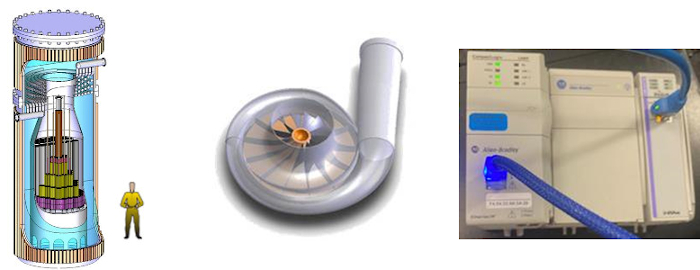
SLIMM & VSLLIM Publications Dynamic Conversion Publications Nuclear Cybersecurity Publications

CFD Publications Thermoelectric Conversion Publications Heat Pipe Publications
To find our publications on more research areas click here
Recent News
Founding Director
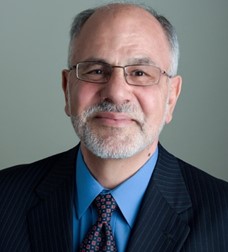
Mohamed El-Genk, Distinguished and Regents' Professor of Nuclear, Mechanical and Chemical and Biological Engineering and the Founding Director of the Institute for Space and Nuclear Power Studies has been named the recipient of the 2010 Donald Q. Kern Memorial Award by the Transport and Energy Process Division of the American Institute of Chemical Engineers. This award given in honor of Donald Q. Kern, a pioneer in process heat transfer, is one of the most prestigious in the world in recognizing significant contributions to the fields of applied heat transfer or energy conversion or in the translation of research results into useful technological applications. Dr. El-Genk joined the recognized leaders in the field of heat transfer who received this award since 1974.
He has also been named named the recipient of the American Nuclear Society thermal-hydraulics Technical Achievement Award for 2015. The award is in recognition of his exceptional contributions to the understanding of terrestrial and space reactor thermal hydraulics phenomena and for his impact on the thermal hydraulics community as a researcher, educator, and leader.
Dr. El-Genk was named the recipient of the American Society of Mechanical Engineers 2017 Heat Transfer Memorial Award for his outstanding contributions to boiling enhancement; immersion cooling of electronics; forced, natural, and combined convection in rod bundles; heat pipes and thermosyphons; impinging and swirling jets heat transfer; thermal-hydraulics of nuclear reactors; and thermal management of space nuclear power systems.
He has also been named the recipient of the ANS 2021 Reactor Technology Award in recognition of extraordinary contributions towards advancing space and micro reactor technologies
Dr. El-Genk is a fellow of the American Nuclear Society, the American Society of Mechanical Engineers, the American Institute of Chemical Engineers, and the International Association for the Advancement of Space Safety, and an associate Fellow of the American Institute of Aeronautics and Astronautics. He is a member of the Assembly of the International Heat Transfer Conference (IHTC), the Organizing, Steering and U.S. Scientific committees of the 2010 14th IHTC, and the Scientific Committee of the International Center for Heat and Mass Transfer.
Seniors in the in the Nuclear Engineering Department visit the UNM-ISNPS Lab
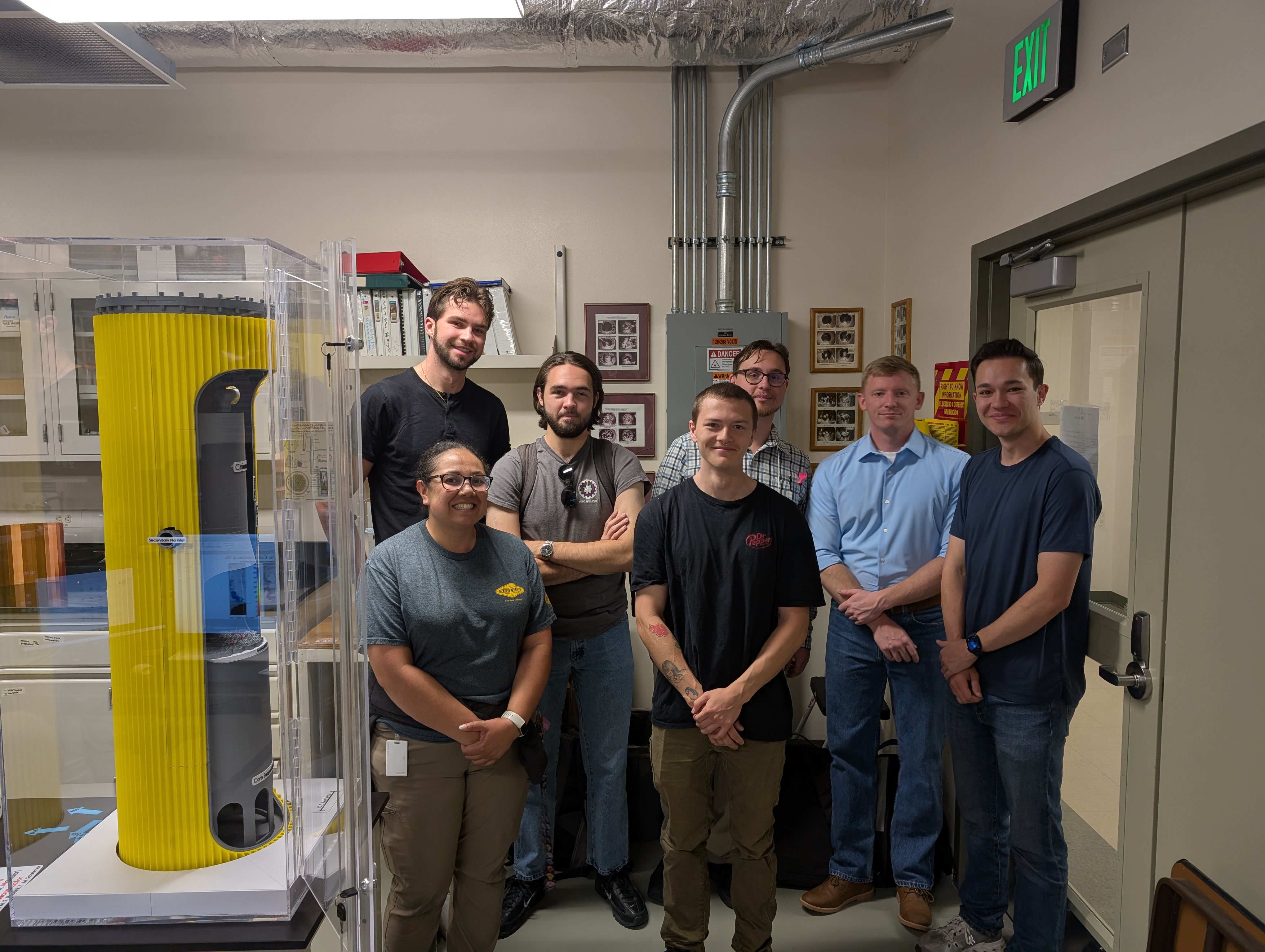
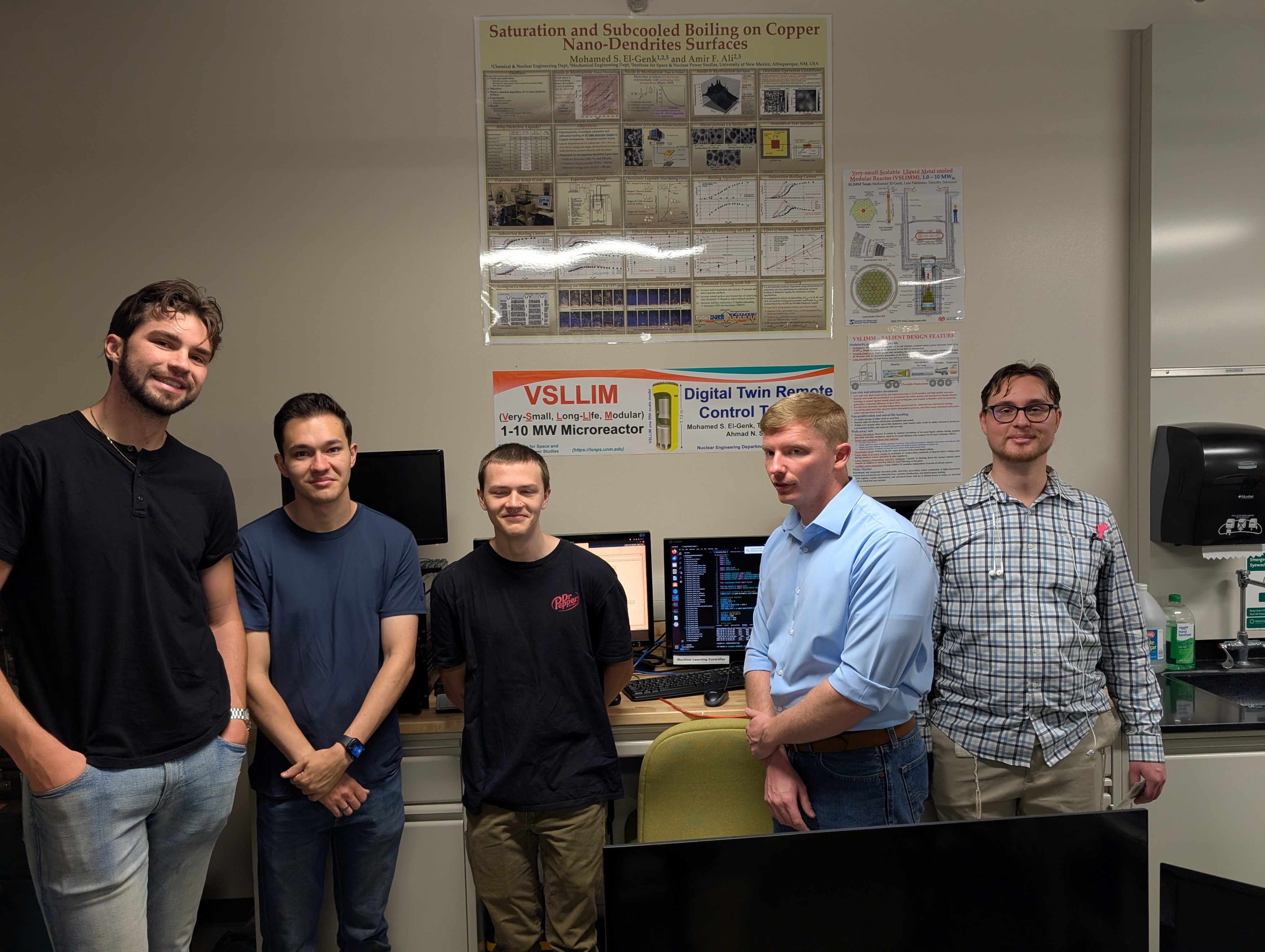
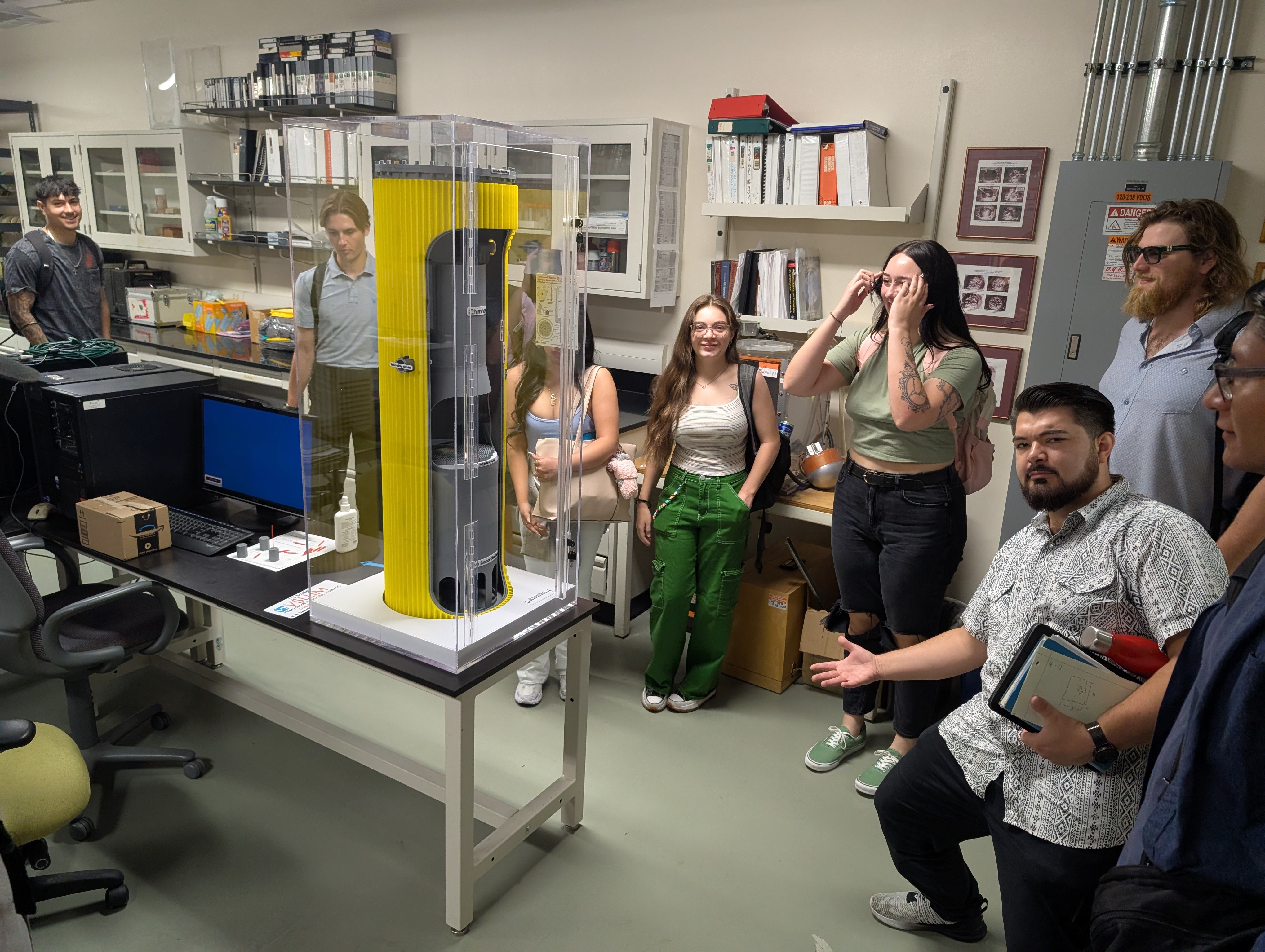
Nuclear Engineering seniors at the University of New Mexico visited the ISNPS Thermal-Hydraulics Lab B136 in the basement of Centennial Engineering building to learn about Modular Microreactor research being done at ISNPS. They viewed and inspected the 1:5 scale model of the developed invention of the fully passive, walk away safe, fast spectrum, sodium cooled VSLLIM (Very Small Long-Life Micro) reactor. It can be deployed with the entire power plant on an 18-wheeler truck, a railcar, or a barge. The plant would generate both heat and electricity for remote communities, military bases in desert and cold areas, and remote mining operations. The VSLLIM plant employs open air Brayton Cycle Engines to convert the reactor heat to electricity at an efficiency > 40%. It operates fully passive, requires no water cooling and can generate 1.0 to 10 MW of thermal power continuously for > 90 yr and > 6 yr, respectively. VSLLIM modular micro reactor design and associated IP disclosures have been licensed by the UNM Rainforest Innovation to Eagle Energy ( https://https://eagleenergymetals.com/ ) for commercial development, deployment, and marketing.
ISNPS Graduate Student Keenan Kresl-Hotz Awarded for Presentation at ANS 2025 Student Conference
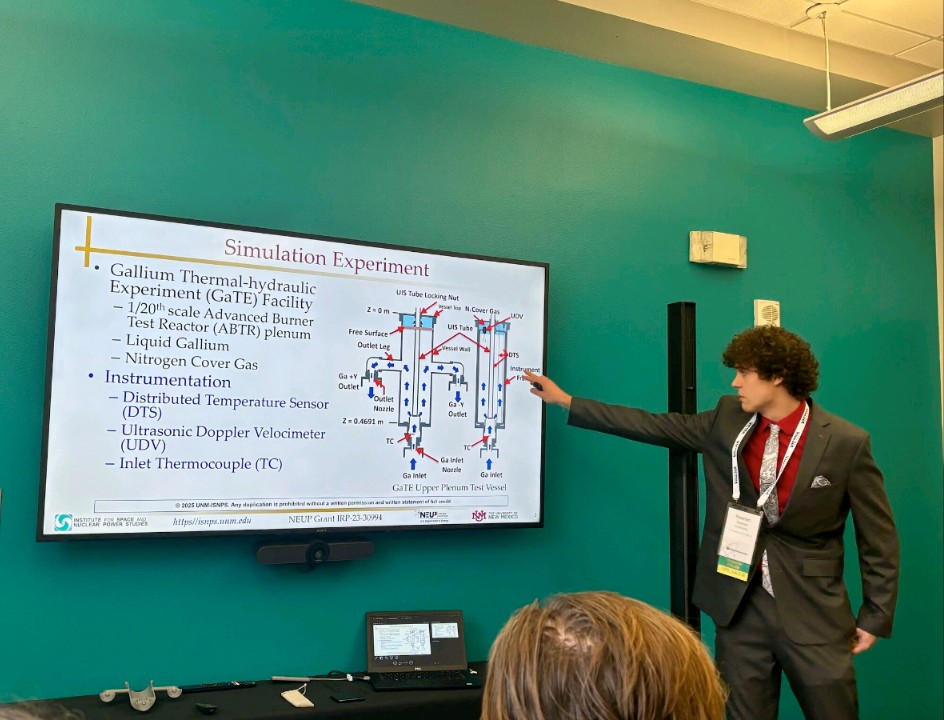
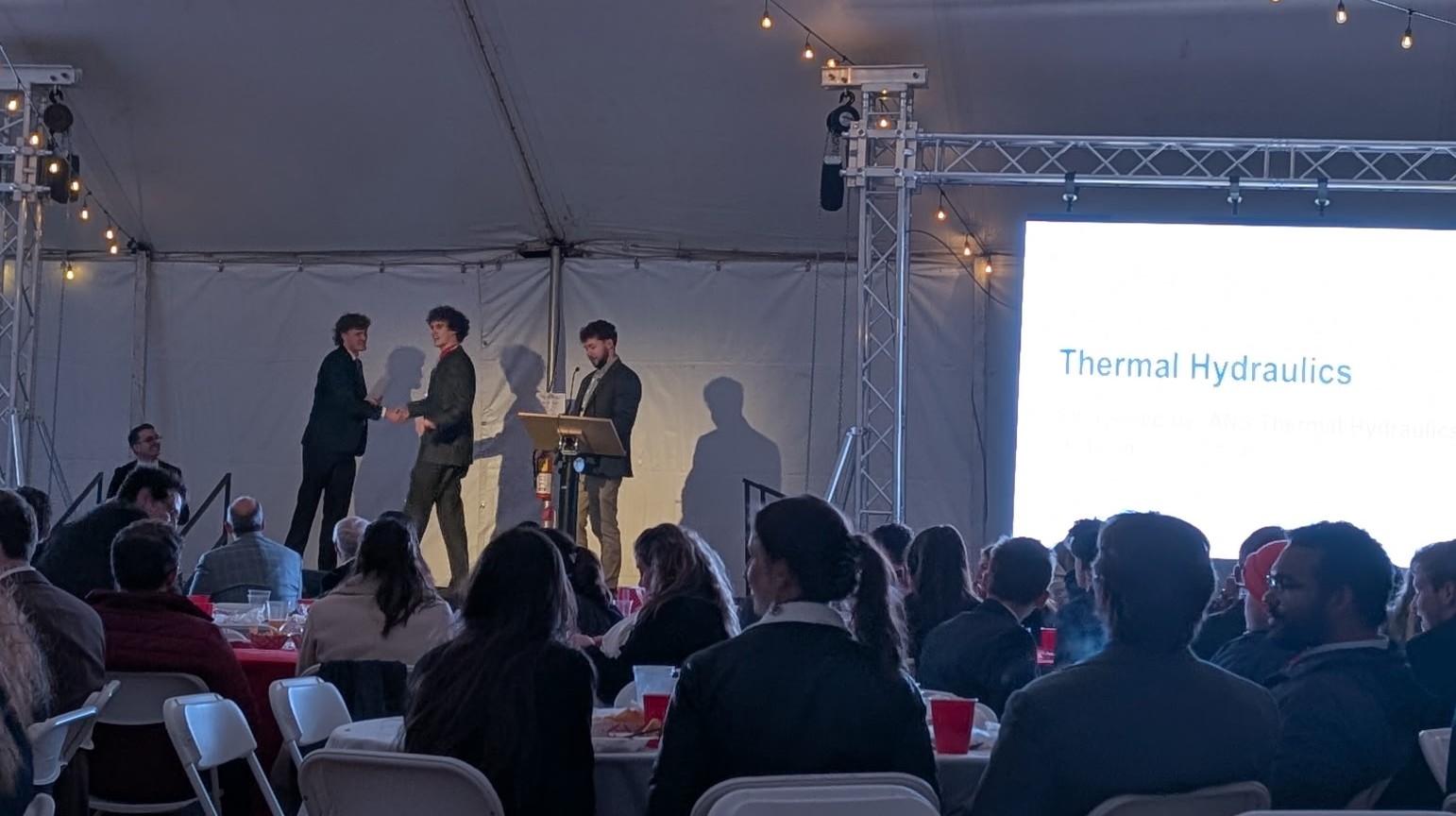
During the 2025 American Nuclear Society Student Conference hosted by the University of New Mexico (UNM) in Albuquerque, NM April 3-5, Keenan Kresl-Hotz a graduate research assistant with UNM's Institute for Space and Nuclear Power Studies (ISNPS) and NE department received the best graduate student presentation award in the Thermal-Hydraulics track. Keenan's presentation "CFD Analyses of the Flow Mixing and Stratification in Pool Type SFR" discussed computational fluid dynamics (CFD) simulation of liquid gallium flow mixing in experiments performed at Purdue University. The experiments examined flow mixing in an upper plenum geometry for pool-type sodium fast reactors. The presented work, performed with Distinguished and Regents' Professor Mohamed S. El-Genk and Research Associate Professor Timothy Schriener, investigated the effects of the liquid gallium inlet velocity on the intensity of flow mixing within the experimental plenum vessel using Large Eddy Simulation (LES) CFD simulations using the STAR-CCM+ Multiphysics commercial CFD. The calculated time average flow velocities agreed with the reported experimental measurements.
This work is part of a current DOE IRP project "Exascale Simulation of Thermal-hydraulics Phenomena in Advanced Reactors and Validation using High Resolution Experimental Data" lead by City College of New York, in collaboration with UNM-ISNPS, Purdue University, and Argonne National Laboratory. This project objective to investigate the effectiveness of using large scale CFD simulations to model thermal-hydraulic experiments investigating phenomena of interest to the safety of advanced liquid metal cooled fast reactors and high temperature gas-cooled reactors. The obtained CFD simulation results using the STAR-CCM+ commercial code will be compared to those of CFD simulations conducted using the nekRS CFD code under development at Argonne National Laboratory and reported experiment measurements. Another objective of this DOE NEUP-IRP award is to provide education and training opportunities for students at the collaborating universities.
The abstracts can be accessed at ( https://isnps.unm.edu/publications/abstracts/ANS_9440-paper.pdf ) and ( https://isnps.unm.edu/publications/abstracts/ANS_9466-paper.pdf )
UNM alumni Dr. James Gover presents on bridging the gap between engineering and public policy to UNM Nuclear Engineering Department
Dr. James Gover visited the UNM NE Department to discuss his experiences on engaging with federal and state legislators in policy development. His talk discussed his past successes and failures and the lessons current and future engineers could take to try to help shape a vibrant nuclear future for New Mexico and the United States. Dr. Gover encouraged the graduate students in attendance to reach out and contact their state representatives and the governor to become engaged to share their voice on nuclear energy and technologies future role for New Mexico.
Dr. Gover worked at Sandia National Laboratories for 35 years, where he worked on radiation effects, firing set development and policy research. He was a professor and chair of the Electrical and Computer Engineering Department at Kettering University for 13 years. He is currently self-employed and conducts economic development research. He is the recipient of several awards and honors from the Institute of Electrical and Electronic Engineers (IEEE), including as a Life Fellow IEEE studying radiation effects in nuclear systems, IEEE-USA Congressional Fellow, IEEE-USA Committee Competitiveness Fellow, and more.
Masters Graduation - Ahmad Shaheen
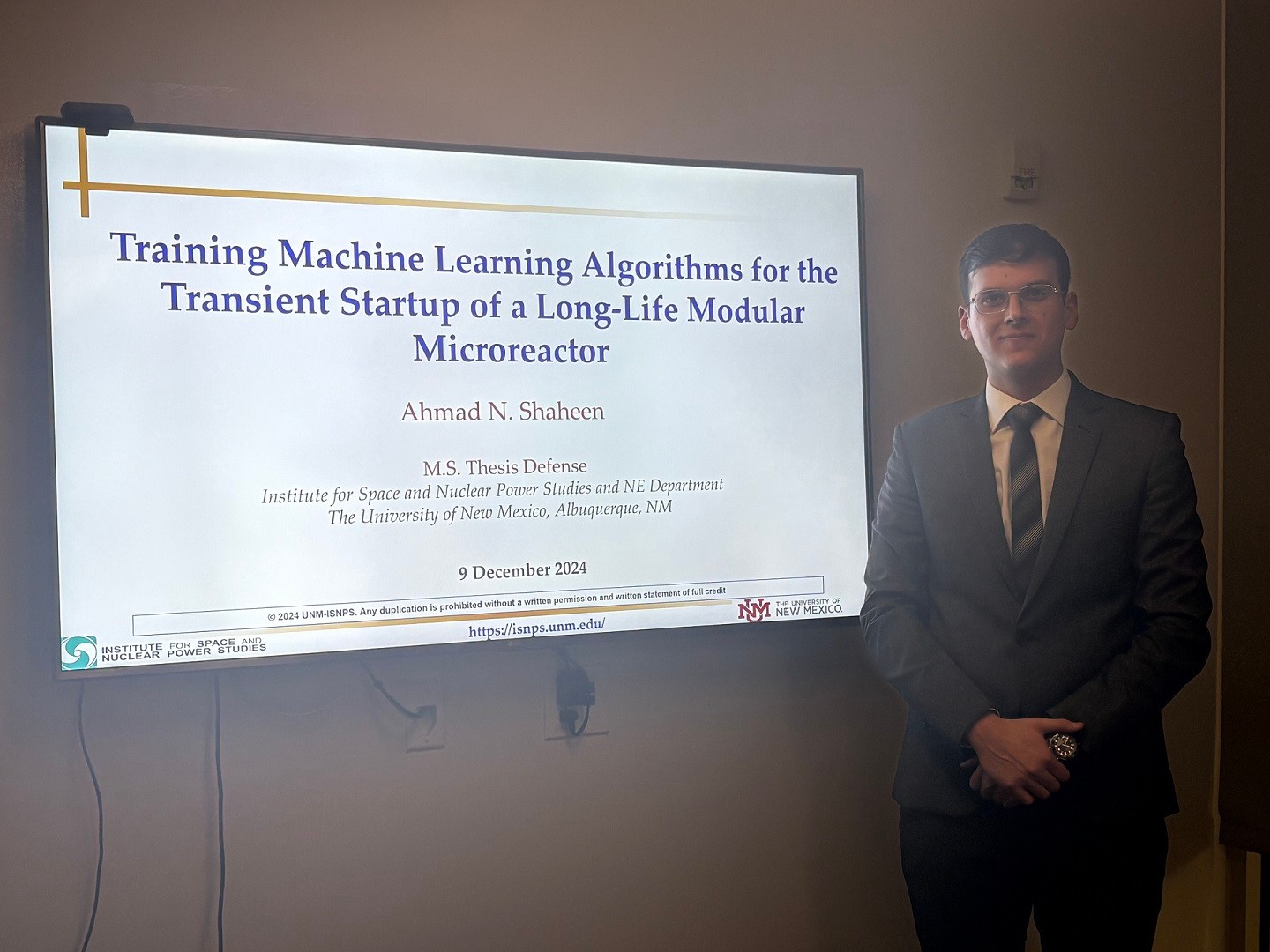
ISNPS student Ahmad Shaheen graduated with a M.S. degree in Nuclear Engineering at the University of New Mexico. His advisor was Dr. Mohamed S. El-Genk, Distinguished and Regents' Professor of Nuclear, Mechanical, and Chemical and Biological Engineering and Founding Director of the Institute for Space and Nuclear Power Studies (ISNPS). Ahmad's thesis, titled Training Machine Learning Algorithms for the Transient Startup of a Long-Life Modular Microreactor, encompassed his research using Machine Learning (ML) algorithms within the Supervised Learning (SL) and Reinforcement Learning (RL) paradigms to train artificial neural networks to manage the movement of the control rods in the Very-Small, Long-LIfe, Modular (VSLLIM) microreactor developed at the University of New Mexico's Institute for Space and Nuclear Power Studies (UNM-ISNPS). The trained neural networks attempt to predict the positions of the control rods for a smooth startup to nominal, full-power steady state condition. The research successfully demonstrated training neural networks using the Soft Actor Critic (SAC) RL algorithm for control of the VSLLIM microreactor during startup. This work was performed as part of a DOE Nuclear Engineering University Program project led by Purdue University collaborating with UNM-ISNPS to investigate methods for autonomous and remote control of microreactors.
El-Genk invited speaker at the Open Plenary Panel at ANS Winter Meeting, 17-21, 2024.
Distinguished and Regents' Professor of Nuclear Engineering and the founding Director of the Institute for Space and Nuclear Power Studies ( https://isnps.unm.edu/ ) has been an invited speaker at the Open Plenary Panel of the American Nuclear Society's Winter Meeting and Expo ( https://www.ans.org/meetings/wc2024/ ) held in Orlando, FL, 17 - 21, 2024. He delivered a talk entitled, "Nuclear Power: Projected Growth and Futurities," reviewing the status and potential growth of nuclear power for space exploration and planetary missions and for providing clean baseload and environmentally friendly energy option for meeting the projected phenomenal growth in electricity demand to power Data Center in the US and abroad. In COP28 in Dubai, UAE ( https://unfccc.int/cop28 ) and COP29 ( https://unfccc.int/cop29 ) in Baku, Azerbaijan, 31 Countries and > 120 companies signed a joint statement to TRIPLE global nuclear energy capacity by 2050, in the drive to cut greenhouse gas emissions. El-Genk also highlighted the recent and future increased demand for Small Modular Reactors (SMRs) and Modular Micro Reactors (MMRs) for baseload power supply for Data Centers, and remote communities and mining activities in the US and abroad. He concluded with a vision and recommendations future actions to support the projected growth in nuclear power in the US and for the US nuclear Industry to claim a global market share of nuclear energy growth in developing countries and underdeveloped counties in Europe, Africa, and Asia. He also highlighted the designs features of developed designs of the walk-away safe and passively operating SLIMM-SMR and VSLLIM-MMR developed at the University of New Mexico's Institute for Space and Nuclear Power Studies for long operation lives with no onsite storage of either fresh or spent nuclear fuel. These reactor designs passively respectively generate 10-100 MW and 1.0- 10 MW of thermal power for electricity generation and for providing thermal power at up to 800 K to a host of industrial applications and remote mining operations in arid and remote locations. ( https://isnps.unm.edu/publications/topic/slimm_reactor_concept/ ) They will be fully constructed, assembled and sealed in factory delivered on a portable platform or installed below ground and mounted in seismic insulation bearings at selected sites.
Research Team
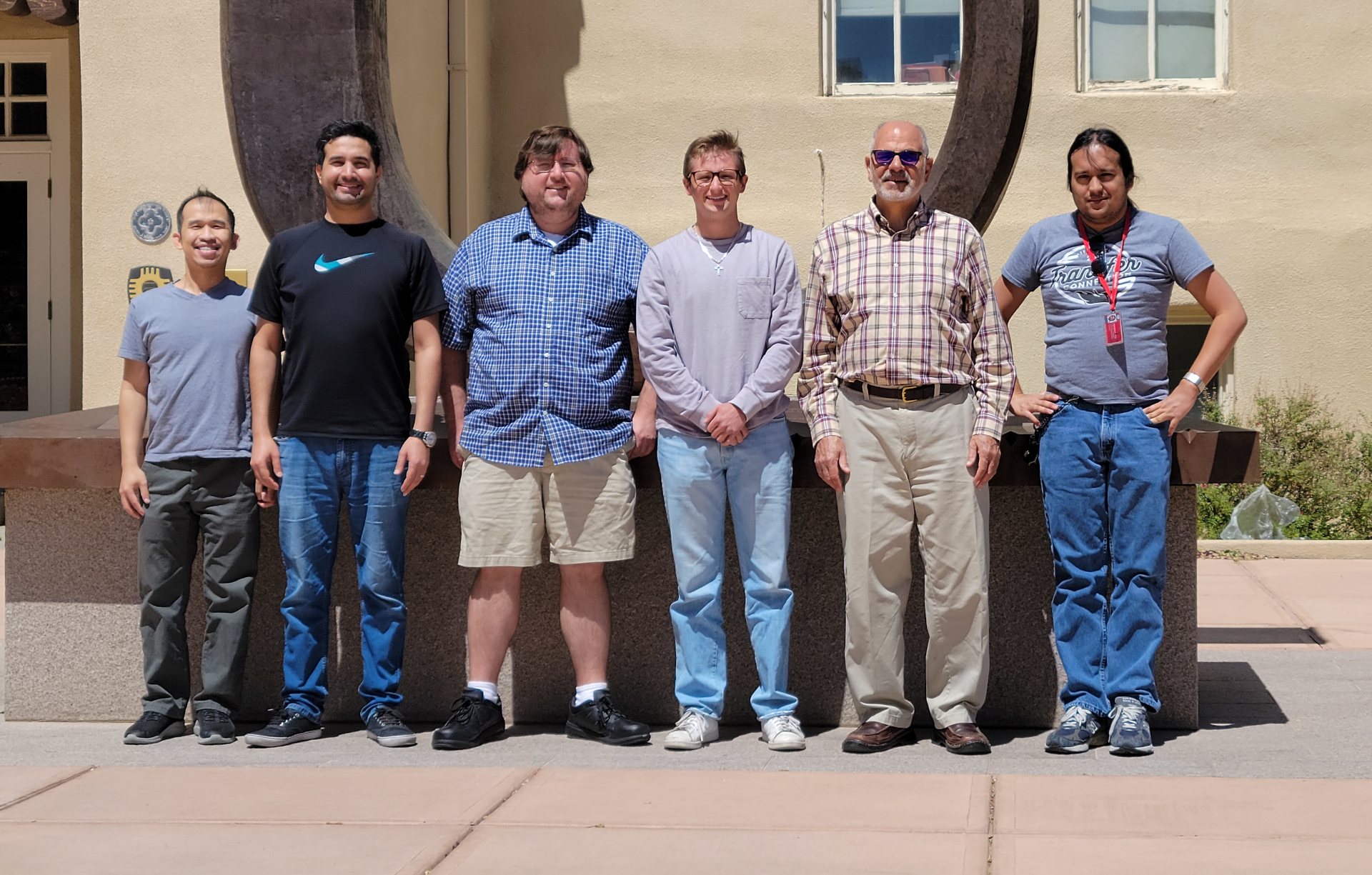
The ISNPS group picture taken in June of 2022 outside of Hodgin Hall. From left to right, Front: Quoc Duong, Ragai Altimimi, Dr. Timothy Schriener, Christian Arguello, Prof. Mohamed El-Genk, Christopher Wolfe. To view each person individually, you may view the faculty and student indices.



